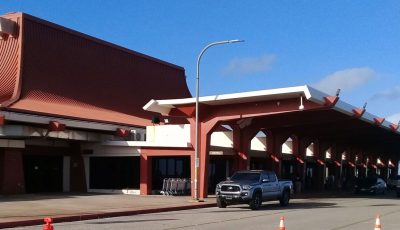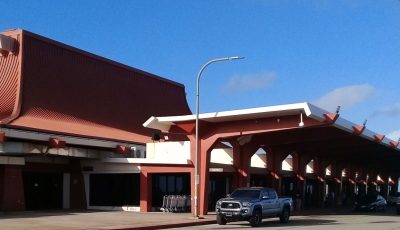Fitch affirms ‘BB’ rating of CPA seaport revenue; outlook stable
Credit rating agency Fitch Ratings has affirmed the “BB” rating on approximately $18.3 million of outstanding Commonwealth Ports Authority senior series 1998A and 2005A seaport revenue bonds. The Rating Outlook is Stable.
The rating reflects the essentiality of the ports to a small, island economy amidst high exposure to economic volatility from tourism and a nearly 100% import-based cargo operation. The rating also considers CPA’s sustained revenue performance and history of controlled expenses. Despite recent adverse impacts on operational performance, CPA is expected to maintain financial metrics supportive of the current rating level. Under Fitch’s rating case scenario, which incorporates coronavirus-related stresses, coverage levels average 2.1x through the forecast period. CPA further benefits from robust liquidity levels that provide some mitigation to a prolonged softening of cargo demand.
The outbreak of coronavirus and related government containment measures worldwide create an uncertain global environment for both cargo and cruise operations. Material changes in revenue and cost profile are occurring across the port sector and will continue to evolve as economic activity and government restrictions respond to the ongoing situation. Fitch’s ratings are forward-looking in nature, and Fitch will monitor developments in the sector as a result of the virus outbreak as it relates to severity and duration, and incorporate revised base and rating case qualitative and quantitative inputs based on expectations for future performance and assessment of key risks.
The seaports remain essential for the import of goods to an island economy; however, there is potential for stagnant operational trends due to CNMI’s exposure to macroeconomic factors and its elevated dependence on a limited tourist base. Volume stability is expected given that food and fuel related cargos account for more than 50% of import-dependent revenue tonnage.
The CNMI’s narrow economy and exposure to economic volatility limit management’s economic flexibility to raise rates on seaport system tenants and users. Following the last increase in 2009, the authority’s focus has instead been on effective containment of operating expenses.
The ports once handled nearly twice as much cargo and are in satisfactory condition to deal with current and forecasted demand. The authority’s capital improvement plan is manageable and funded with grants and internally generated funds. No additional debt is anticipated in the near to medium term.
The authority maintains 100% fixed-rate, fully amortizing debt with a level debt service profile and a 2031 final maturity. Structural features and reserves are sufficient and consistent with other Fitch-rated ports.
Financial profile
CPA maintained favorable leverage and liquidity metrics offset by a modest coverage ratio of 2.2x in fiscal 2019 (unaudited). Estimated fiscal 2019 net debt-to-cash flow available for debt service is negative, reflecting cash balances exceeding debt outstanding. The CPA maintains strong balance sheet cash and reserves available for operating expenses, with days cash on hand currently exceeding 1,900. These liquidity and leverage metrics provide the CPA with some degree of flexibility to meet financial commitments in weak performing periods. Rating case coverages, when including stresses related to coronavirus, are expected to average 2.1x through the forecast period.
Rating sensitivities
Factors that could, individually or collectively, lead to positive rating action/upgrade:
• Given the ports’ limited operating profile and significant exposure to local economic factors, positive rating migration is not anticipated at present.
Factors that could, individually or collectively, lead to negative rating action/downgrade:
• A severely weakened underlying service area economy that results in the seaports’ inability to maintain cargo levels at or near current levels for a sustained period;
Depressed debt service coverage levels resulting from declining operating revenues;
• A shift in the seaports’ balance sheet liquidity and financial flexibility resulting from changes in operating expense management or pricing power.
Credit update
Revenue trends have been volatile in the past few years, attributed to the reduction in inbound revenue tonnage and damage from storms such as Super Typhoon Yutu that have passed through the CNMI. While the ports are located in an island economy with exposure to tourism, CPA also has a mix of non-operating revenues (grants and interest income) to help offset declines in operating revenue.
Seaport operations at all three ports (Saipan, Tinian, and Rota) have continued through the current pandemic. Although operations have not ceased, the reduction in incoming revenue tonnage has led to an anticipated 20% decline in overall seaport revenues in fiscal 2020. Total tonnage through August 2020 (11 months of fiscal 2020) is currently down approximately 24% to 412,104 tons in comparison to the prior year.
Management has indicated that tenants and operators have been making timely payments. Additionally, the CPA board approved a tenant relief program for seaport tenants, which provided discounts on lease fees over the course of six months from April 2020 through September 2020.
In light of the pandemic, CPA also implemented significant austerity measures to reduce operational costs and help offset the anticipated decline in revenues in fiscal 2020. Effective March 1, 2020, these austerity measures include reduction of employee hours by 16 hours bi-weekly and a freeze on all personnel actions and travel outside of the CNMI.
Coverage in fiscal 2019 is estimated to be approximately 2.2x and leverage remains negative. Though coverage is expected to weaken in the near term, the reductions in seaport operations and revenue are offset by stable non-operating income and a low debt service obligation of just over $3 million.
Financial analysis
Fitch has developed two scenarios that serve as the basis for this review. The two cases are labeled as the “Coronavirus Rating Case” and the “Coronavirus Severe Downside Case.” Given the current economic environment due to the coronavirus and the unlikeliness of a stable operating environment over the near term, Fitch’s Coronavirus Rating Case is also considered the Base Case.
Fitch’s scenarios assume modest cargo declines in the final quarter of 2020 and into 2021, reflecting the potential for additional spikes in coronavirus cases resulting in lessened economic activity and a recessionary period. Cargo recovery to 2019 levels is anticipated by calendar year 2022 under rating case assumptions. (PR)



























